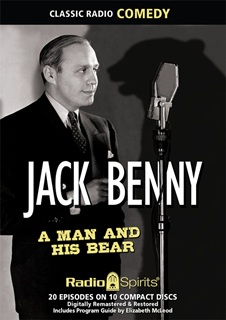
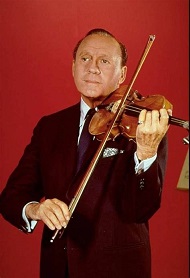 The Jack Benny Program (1932-1955) aired “Jack Discovers He Bought an Ostrich for Thanksgiving Dinner” on November 19, 1939. Jack Benny (1894-1974) was one of the most beloved comedians in America for close to 50 years, his wide-ranging career spanning vaudeville, radio, film, and television. Over time and the result of an ever-evolving act (one by accident) his two “brand” characteristics for which he became known were his stingy, miserly, penny-pinching affair with money, and his awful violin playing, both traits leading to no end of comedic fair play with his co-workers and guests (both radio and TV). Of course, Benny in real life was neither miserly nor as awful a violin player as his act portrayed him to be, but he milked both to excellent effect, and audiences loved him for the self-deprecating humor that resulted. Speaking of his violin playing, according to his wiki page, “At 14, Benny was playing in dance bands and his high school orchestra.” And “In 1911, he began playing the violin in local vaudeville theaters for $7.50 a week (about $220 in 2020 dollars).” In 1917 Benny joined the Navy during WWI, where he would entertain his fellow sailors with his violin playing. The story goes that one evening he actually got booed, but with support from fellow sailor and actor Pat O’Brien Benny ad libbed his way out of the situation and left his audience laughing. Thus was born the shtick Benny would later use to great effect
The Jack Benny Program (1932-1955) aired “Jack Discovers He Bought an Ostrich for Thanksgiving Dinner” on November 19, 1939. Jack Benny (1894-1974) was one of the most beloved comedians in America for close to 50 years, his wide-ranging career spanning vaudeville, radio, film, and television. Over time and the result of an ever-evolving act (one by accident) his two “brand” characteristics for which he became known were his stingy, miserly, penny-pinching affair with money, and his awful violin playing, both traits leading to no end of comedic fair play with his co-workers and guests (both radio and TV). Of course, Benny in real life was neither miserly nor as awful a violin player as his act portrayed him to be, but he milked both to excellent effect, and audiences loved him for the self-deprecating humor that resulted. Speaking of his violin playing, according to his wiki page, “At 14, Benny was playing in dance bands and his high school orchestra.” And “In 1911, he began playing the violin in local vaudeville theaters for $7.50 a week (about $220 in 2020 dollars).” In 1917 Benny joined the Navy during WWI, where he would entertain his fellow sailors with his violin playing. The story goes that one evening he actually got booed, but with support from fellow sailor and actor Pat O’Brien Benny ad libbed his way out of the situation and left his audience laughing. Thus was born the shtick Benny would later use to great effect 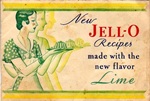 throughout his career, threatening to play his violin, which always got a rise out of his audiences and worked even better with a live TV audience after he got his own show (which show ran from 1950-65 and would garner him a Golden Globe Award in 1958 as Best TV Show, and in 1957 & 1959 a Primetime Emmy Award as Best Lead Actor in a Comedy Series). Over the decades of his life and career Jack Benny would meet, work with, or befriend a great many famous performers, only a few of which included Zeppo Marx, Walt Disney, Lucille Ball, Robert Taylor, and Mel Blanc. But
throughout his career, threatening to play his violin, which always got a rise out of his audiences and worked even better with a live TV audience after he got his own show (which show ran from 1950-65 and would garner him a Golden Globe Award in 1958 as Best TV Show, and in 1957 & 1959 a Primetime Emmy Award as Best Lead Actor in a Comedy Series). Over the decades of his life and career Jack Benny would meet, work with, or befriend a great many famous performers, only a few of which included Zeppo Marx, Walt Disney, Lucille Ball, Robert Taylor, and Mel Blanc. But 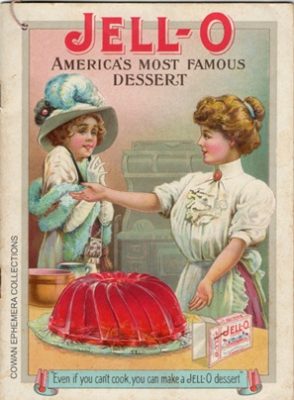 it was none other than fellow comedian George Burns (1896-1996), of Burns & Allen fame, with whom he became closest friends for 50 years. George Burns got one of the lead roles in the 1975 film The Sunshine Boys due to his friend Jack Benny. Jack had won the role but ill health forced him to back out, at which time he prevailed upon the producers to hire George Burns. It was the first time Burns would appear in a film since 1939, and he would go on to win a Best Supporting Actor Oscar for his performance. The film was released in 1975, so Benny never saw the film. Jack Benny was born on Valentine’s Day, February 14, 1894 and died the day after Christmas, December 26, 1974 of pancreatic cancer at age 80. He was born on a holiday and died the day after a holiday. George Burns attempted to deliver a eulogy but broke down early and could not continue. Bob Hope then delivered a eulogy for Benny.
it was none other than fellow comedian George Burns (1896-1996), of Burns & Allen fame, with whom he became closest friends for 50 years. George Burns got one of the lead roles in the 1975 film The Sunshine Boys due to his friend Jack Benny. Jack had won the role but ill health forced him to back out, at which time he prevailed upon the producers to hire George Burns. It was the first time Burns would appear in a film since 1939, and he would go on to win a Best Supporting Actor Oscar for his performance. The film was released in 1975, so Benny never saw the film. Jack Benny was born on Valentine’s Day, February 14, 1894 and died the day after Christmas, December 26, 1974 of pancreatic cancer at age 80. He was born on a holiday and died the day after a holiday. George Burns attempted to deliver a eulogy but broke down early and could not continue. Bob Hope then delivered a eulogy for Benny.
Like all Jack Benny shows on radio, it stuck with the old time variety show format, in contrast to other comedy radio shows employing a single 25-30 minute themed sketch (like Duffy’s Tavern, The Life of Riley, and The Mel Blanc Show for just three examples). Thus, the first 14 minutes or so of this episode we find jokes, playful banter, and a vocal number, but nary a word addressing Thanksgiving. This theme is then introduced gradually in the last half of the show, prefaced with some chuckle-inducing word play abut the show’s sponsor, Jell-O, with even a nod to a new flavor recently introduced into the Jell-O dessert pantheon: Lime (see ad above). But then we get down to Jack’s hosting Thanksgiving dinner and cooking the “turkey,” which we find out from Benny’s faithful house man, valet, and welcome comic relief Rochester, is not exactly what Jack thought he had bought. Of course, laughter follows as Jack is duly humiliated and made fun of, though things work out in the end. To find out just how, set aside a few minutes prior to Thanksgiving (coming this Thursday, the 27th) and enjoy this light-hearted bit of goofiness as “Jack Discovers He Bought an Ostrich for Thanksgiving Dinner.”
During his closing remarks the announcer wishes listeners to enjoy a happy Thanksgiving whether they observe it on the upcoming next to last Thursday in November (the 23rd) or the last Thursday in November (the 30th). Why two Thanksgivings mentioned in 1939? Because then-President Franklin D. Roosevelt had recently moved Thanksgiving to the next to last Thursday in November to give the upcoming Christmas season more time. This was not a popular move and several states refused to acknowledge the new date, so they continued to celebrate Thanksgiving on the accustomed last Thursday of November (which sometimes had a 5th Thursday). Confusion continued until 1941 when Congress passed a joint resolution making the 4th Thursday in November the official day of celebration for Thanksgiving. FDR signed it into law on December 26, 1941 and the law took effect in 1942, remaining unchanged ever since. The 4th Thursday in November is the official date for Thanksgiving in the United States.
(The linked CD above contains this episode and 19 others, all remastered and restored on 10 discs.)
Play Time: 29:30
[Left: Wild Turkey – Center: Norman Rockwell’s 1943 painting “Freedom From Want” – Right: Wild Ostrich]
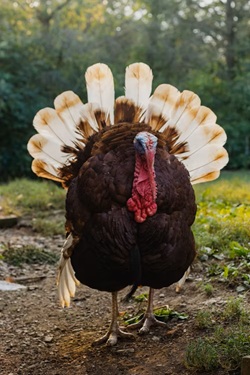
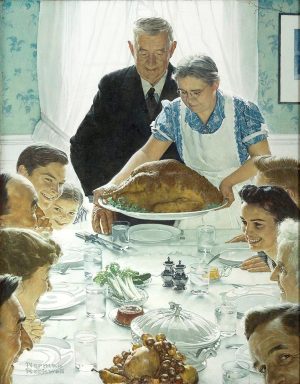
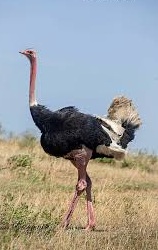
To view the entire list of weekly Old Time Radio episodes at Tangent Online, click here.